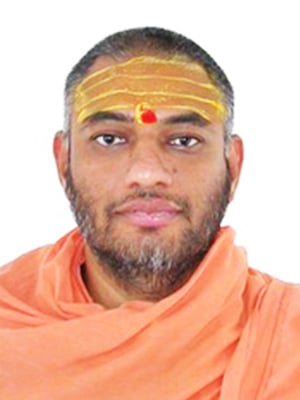
Brihadaranyaka Upanishad Immersion
What is the Brihadaranyaka Upanishad Immersion?
It is an immersion in the traditional study of Vedanta offering a deep dive into the Upanishads.
What does the Brihadaranyaka Upanishad Immersion involve?
The Mahatma (great saint or sage), Swami Paramananda Giri, will be chanting the original Sanskrit verses in the daily morning class from 8 to 10 am. Following the chanting, Swami Paramananda Giri will translate the verses to English and will teach the traditional commentary of Adi Shankaracharya and Ananda Giri. This method is the most authentic way to study and practice Vedanta and has been utilized for thousands of years in India to help spiritual speakers grasp the answers to such questions as: What is the Self? Who am I?
The practice of listening to a great saint or Mahatma relay the knowledge of the Vedas, ancient scriptural texts in India, has been the foundation for spiritual liberation for countless people. This immersion offers the doorway through which moksha or true freedom is attained.
It is not necessary to attend the entire immersion, but we ask that you if you do choose to join, that you attend daily during your stay—the immersion consists of one morning class from 8am to 10am, leaving plenty of time to attend both of the daily satsangs, one yoga class, both of the delicious vegetarian meals, as well as to enjoy the ashram grounds.
What is Vedanta?
Vedanta is a school of Hindu philosophy. It translates to the “end of the Vedas” or the “end of all knowledge”. It reflects the ideas that emerge from the study of the Upanishads, which deal with topics such as knowledge and liberation. Vedanta, or the study of the Vedas (the oldest scriptures of Hinduism), form the basis of Jnana Yoga, the Yoga of Knowledge.
What are the Upanishads?
The Upanishads are the most recent part of the Vedas, the oldest scriptures of Hinduism. While earlier parts of the Vedas deal with mantras, benedictions, rituals, and ceremonies, the Upanishads deal with meditation, philosophy, consciousness, and various ontological knowledge (that is, the knowledge pertaining to the nature of being). In short, studying the Upanishads is studying what is Real and what is Unreal. It is the study of the Self.
Why study Vedanta? Why partake in the immersion? What are the benefits of studying with a Mahatma like Swami Paramananda Giri?
This course is a classical example of the practice of Jnana Yoga (the Yoga of Knowledge), which consists of:
-
- Savanna, listening to the teachings of the Upanishads
- Manana, reflecting on their meanings
- Nididhyasana, divining into deep meditation on the insights that one receives from the reflection
Mahatmas such as Swami Paramananda Giri are among the most senior teachers of traditional Advaita Vedanta in India. They rarely—if at all—travel to the West or anywhere outside of India. In India, Mahatmas teach in the most traditional high Vedanta institutions such as the Kailash Ashram. These spaces are not even accessible to lay people!
More than a decade ago, Swami Swaroopananda, the acharya or spiritual director of our ashram, started to invite these Mahatmas to come to the Bahamas for a long stay (1-3 months) to teach in-depth intensive Vedanta Courses. He did so to allow the ashram’s swamis, brahmacharis, and senior staff the opportunity to study Vedanta in the appropriate, traditional, and authentic way. These courses are open to all who are at the ashram (guests, karma yogis). They are offered for free and there is no tuition for attending the courses.

Swami Paramananda Giri joined the prestigious Sri Kailas Ashram Brahma Vidya Peetha in 2001 and was initiated into Naishtika Brahmacharya by Shrimat Swami Vidyananda Giriji Maharaj. He was initiated into Sannyasa shortly after. He studied Panineeya Sanskrit grammar, Nyaya of Kapil, Patanjali Yoga Darshan, Prasthana Traya of Advaita Vedanta, and other subsidiary texts of Vedanta. Swami Paramananda Giri currently resides in the Tattvamasi ashram, and teaches Vedanta and Sanskrit to his students.
Let's Stay In Touch
Join our email list to learn more about our in-person and online programs, courses, and free events.







